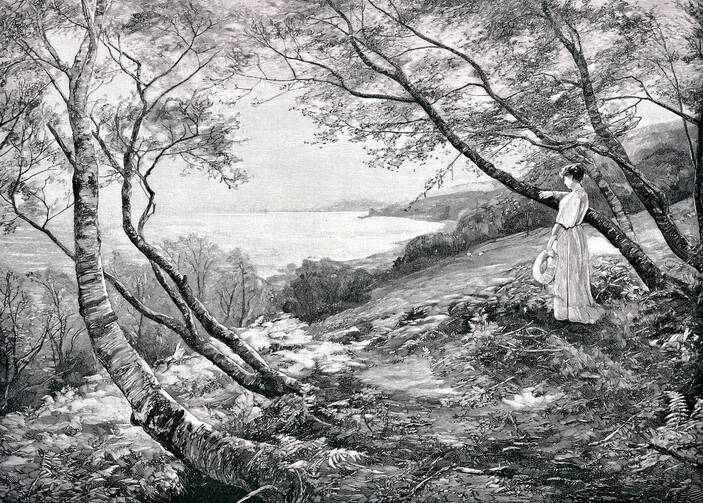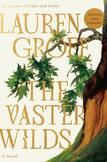Review: A heroine’s journey
Lauren Groff has built herself an international reputation with her fiction over the last dozen years. Her 2018 short-story collection Florida is Pulitzer Prize-worthy. She has published several brilliant novels including Arcadia (2012), the acclaimed Fates and Furies (2015) and Matrix (2021).
Her newest novel, The Vaster Wilds, follows Matrix as the second installment of a planned trilogy. While Matrix is, in part, about 12th-century Catholicism, one of Groff’s topics in The Vaster Wilds is 17th-century Protestantism. An adventure story set in that century, wherein a teenage girl takes a Robinson Crusoe-like journey by foot and by boat through the late-winter wilds of the New World. On her way, the girl contemplates God, religion, nature and a woman’s station in a world dominated by men. An inventive story, it inverts Defoe’s Robinson Crusoe by casting a girl—and only briefly, much later on in the novel, the woman—as its heroine.
Groff’s story begins when our heroine, a semi-anonymous girl, flees her settlement in Jamestown, Va., carrying a bag of precious things: two brown, thick and warm (but lice-ridden) coverlets, a hatchet, a knife, a stolen pewter cup and a flint. The girl, “moorish in her make,” was called Lamentations Callat back in England when she lived in the poorhouse. Her name serves as an insult: Lamentations “to remember the stain of her sin upon her” and Callat, the surname of her prostitute mother. The girl is sometimes called Zed, Wench, Child and Fool, but the third-person narrator calls her simply “the girl.”
The reasons for the heroine’s flight aren’t fully revealed until later in the book. Groff counts on the reader’s curiosity to follow her as she is tracked by male pursuers through the unknown and dangerous wilds—its half-frozen rivers and icy forests and their inherent natural hazards—for a few hundred pages before telling us exactly why she fled her settlement.
Near the onset of her wintry flight, the girl prays:
O god, by whom the meek are guided in judgment, and light riseth up for the godly, grant me in all my doubts and uncertainties the grace to ask what thou wouldst have me do that the spirit of wisdom may save me from all false choices and that in thy light I may see light and in thy straight path may not stumble.
(A fervent enough prayer, methinks, but chunks of similarly capitalization-stingy pseudo-Elizabethan diction and syntax abound throughout the novel and doth difficult reading make.)
In any case, the girl tries to convince herself that she is not alone. She carries “my god in my heart always.” Although fighting starvation, avoiding her pursuers and coping with the enormity of the wilderness cause her briefly to lose her faith in God and forces of nature, her determination and a resurgence of her faith help her endure.
She makes her way north as the wintery landscape cracks and gradually melts. Her trek is still difficult but in different ways. She contemplates her early life in England with the mistress who found and saved her from the poor house. The mistress calls the girl Zed, another insult, as that was the name for a dead monkey and for being “the least and the littlest.” As a household servant, one of the girl’s duties was to care for the mistress’s young daughter Bess, named after the queen of the realm but, alas, a “sweet innocent idiot.”
We discover that our heroine loved and cared for Bess, sometimes like a mother and sometimes like a sister. For years in England, the girl and her adoptive family live an impoverished life, with the girl as little more than a pet or servant and a caregiver to Bess. Eventually, they leave England on a ship called Blessing, headed to the New World and, hopefully, a better life. Unfortunately, they could not have picked a worse time to sail to the Jamestown settlement. It was winter, the historic “starving time” when Jamestown’s settlers were not only hungry but diseased, dying and fighting with local Indigenous tribes.
Conditions were horrible in England but worse at the fort in the New World. Life becomes even more terrible for the girl after she commits an offense that forces her to flee. She knows that “at least one bad man would be sent after her” because of what she has done. She has been wary of men all of her life, knowing that even the gentleman at the fort sometimes needed to be avoided. But there were other men around who were truly bad: the soldiers “with a red gleam of the devil to them and mercenaries who killed as easy as sleeping.”
The wilds and its creatures could be dangerous, but men, the girl concludes, are more dangerous than bears. Groff adds a contemporarily relevant and universal argument to the girl’s fear:
For what woman has not, walking in the dark of the street or along a path deep in the countryside, sensed the brutal imaginings of a man watching her from his hidden place, and felt the same chills chasing over her skin, and quickened her steps to get away.
That passage is also one of the few times the narrator refers to the girl as a woman.
The narrator throughout is omniscient, so we get inside other human minds besides the girl’s, including her dangerous pursuers from the fort: a Jesuit hermit called Sanctus Ioannes Cavae Arboris (Saint John of the Hollow Tree) and the Powhatan and Piscataway, the Indigenous “people of this place” who protect her. The pseudo-Elizabethan narration becomes anthropomorphic at times, as the thoughts of animals—dogs, bears, wolves and even vultures—are revealed. Dogs weigh their alarm and make decisions, night creatures rustle in the trees without caring, and vultures despair. Similarly, after the girl suffers a head wound from a rock thrown by the hermit, she has visions of birds that prophesy her future and her possible death. She sees beams of sunlight that form the rungs of a ladder with angels “busily moving themselves up and down.”
As she makes her way through the wilds, she starts naming the things she observes on her journey, for that “made things more visible.” The girl figures that naming people was how adults granted power to themselves over babies and how Englishmen conferred over the new world and its people. The narrator tells us:
She felt she understood now the first man Adam, how with each name he felt himself growing more powerful, closer to the god who had created and named him. Name after name, Adam felt his dominion tipping into domination until he believed that he owned the world by naming the things in it and that all the things of the world were his to do with as he wished.
The novel is full of Groff’s typical flourishes of poetic genius; the prose, however, written in a deliberately old-fashioned way to reflect the Elizabethan era, can be as slow-moving as the girl’s tortuous journey. Aside from that, I had one other beef with the novel. Even though the girl has lived in the wilds for decades, most of the story unfolds in the first few weeks of her journey. That is followed by a compression of her exploits for the following several decades.
Much seemed to be missing. I would have liked more of the story to be about the woman.
This article also appeared in print, under the headline “A Heroine's Journey,” in the June 2024, issue.











